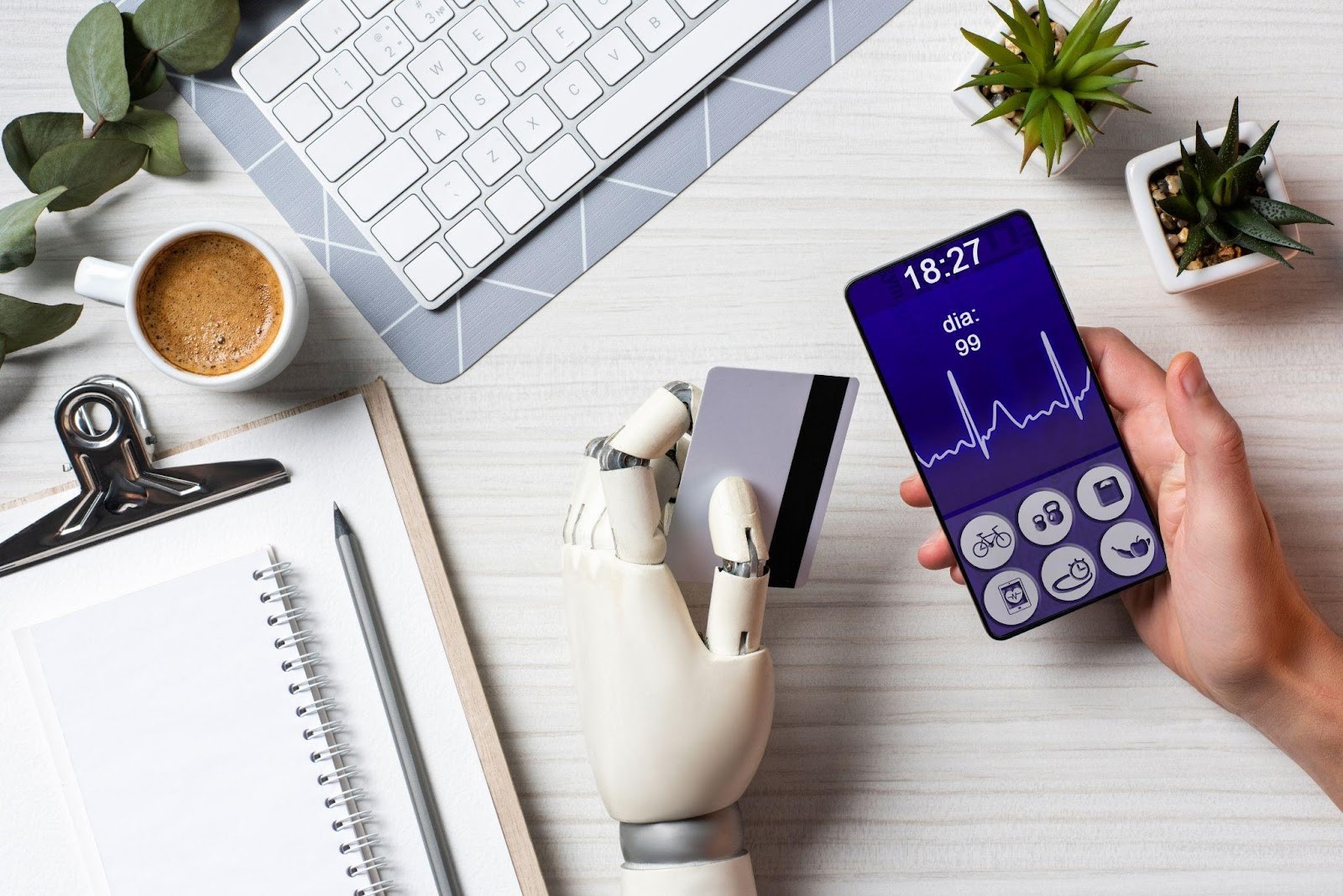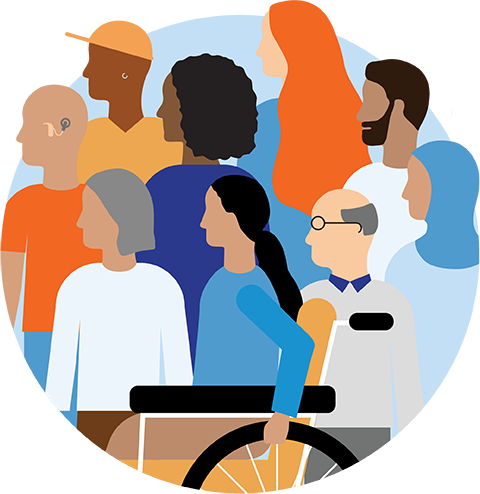Unless you have been in the Himalayas for the past few months, you have might have read or heard the daily stories trending in the media about how AI is transforming healthcare.
According to a research, AI in the healthcare industry is expected to reach $187 billion by 2030.
Well, yes, the number is huge. The implications of AI have already been started, and slowly and gradually, it’s transforming the healthcare industry.
From virtual doctors to predictive diagnostics, the fusion of AI and humans is rewriting the script of medical possibilities.
Let’s dive into the world of AI in healthcare and see how it’s making a difference.
How Will AI Improve Healthcare?
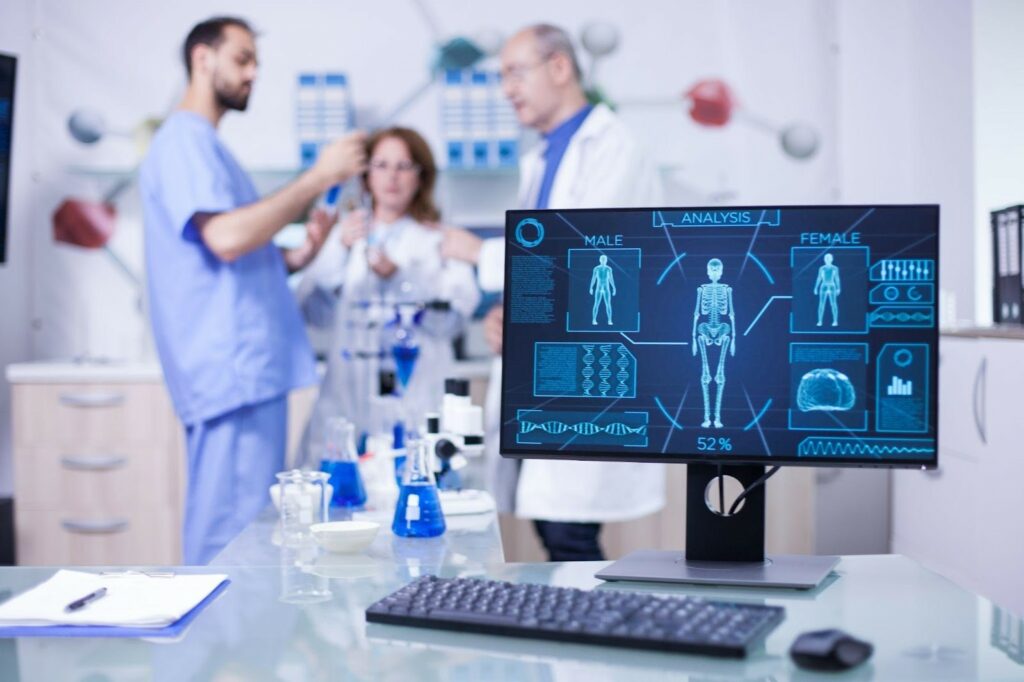
Prior to the emergence of COVID-19, the use of AI and machine learning in healthcare was gradually but slowly improving. These technologies were being used in specific areas like medical imaging and research.
However the pandemic hit caused a rapid increase in the utilization and integration of AI within healthcare operations. The pandemic showcased the effectiveness of AI and machine learning due to their ability to swiftly respond to the different challenges that arose during that time.
AI and machine learning passed this difficult test of time with flying colors. According to a study, AI in healthcare would make this industry much better.
Let’s move further and uncover the hidden potentials of AI in healthcare.
1. Making Healthcare Operations More Efficient

AI can help hospitals make their operations tasks more easy and convenient. How? Let’s see.
- Patient Data
The foundation of today’s healthcare relies heavily on patient data to improve care and develop new treatments. The crucial task of understanding this vast data falls on AI’s shoulders. It excels at finding patterns and insights that humans might miss.
Example: For patients with complex conditions like diabetes, doctors usually pay close attention to more scientific details like blood sugar levels, body weight and family medical history.
In contrast, AI can examine more abstract details like sleep patterns, stress levels, and dietary choices. This can help users uncover subtle correlations that could impact their condition management and overall health outcomes.
- Virtual Nursing Support Systems
You know how short we are of nurses as a country. AI can be a massive game-changer here. Virtual nursing assistants, such as AI-powered chatbots and apps, deliver uninterrupted patient assistance 24/7, replacing the need for manual efforts of the nurses. This would allow them to be where they’re needed the most.
These virtual assistants can handle various tasks, including
- Answering queries about medications,
- Forwarding reports to doctors or surgeons, and
- Assisting patients in scheduling appointments with physicians.
This automation allows doctors to dedicate more of their valuable time and attention to patient healthcare, where human judgment and interaction are crucial.
- Cutting Down on Medication Dosage Errors
One important use of AI may be the detection of mistakes made by patients when self-administering drugs like insulin.
According to a study published in Nature Medicine, up to 70% of patients do not take their insulin prescriptions as prescribed.
AI has the capacity to process data in real-time to detect errors or inaccuracies in how patients use devices such as insulin pens or inhalers.
Early detection of these mistakes enables medical professionals to take quick action, guaranteeing patients take their medications as directed and adhere to recommended procedures.
- Fraud Detection and Prevention
Healthcare systems now find it easier to detect and prevent fraud with AI.
For example,
- AI can flag cases where unnecessary tests are ordered just to get more money from insurance payments.
- It can also easily spot unusual or suspicious patterns in insurance claims, helping to catch fraudulent activities.
- It also helps detect cases where healthcare providers bill for expensive services or procedures that were never actually done.
Thus, AI can help healthcare systems save money and ensure that patients receive fair and appropriate care.
2. AI in Medical Decision Support, Diagnosis, and Treatment

Healthcare is experiencing a notable shift due to AI. Its not just limited to using data for research and diagnosis but also changing how doctors make decisions about patient care.
AI computers are capable of learning from vast amounts of data and finding patterns, which is revolutionizing many aspects of clinical practice. This technology is leading to more personalized treatments and improved patient care.
For example,
- Hospitals now use AI to determine how many days a patient should stay in the hospital. This contributes to better planning, reduced complications, and improved outcomes and cost savings.
- AI tools like IBM’s Avicenna can analyze medical images like CT scans and X-rays to identify abnormalities and recommend appropriate treatment steps.
AI doesn’t replace human care; instead, it aids healthcare professionals with valuable insights.
3. Enhancing Patient Participation Through AI

From accessible EHR information through online platforms to sharing personal health data from wearable devices, technology-driven opportunities for patient engagement continue to expand.
With AI-powered chatbots comes new and improved communication between healthcare providers and their patients, which ultimately results in a new level of personalized care.
With contributions from both sides, i.e., patients sharing their health information and the ability of AI to process large amounts of data, give healthcare providers deeper insights into symptom patterns and effective treatment strategies.
With this deeper understanding, doctors can make informed decisions and discover associations that may not be visible to the human brain alone.
Broadly speaking, AI-enhanced patient engagement improves healthcare outcomes by using data-driven insights and fostering collaborative communication among patients and healthcare teams.
4. Use of AI in Medical Devices and Machines
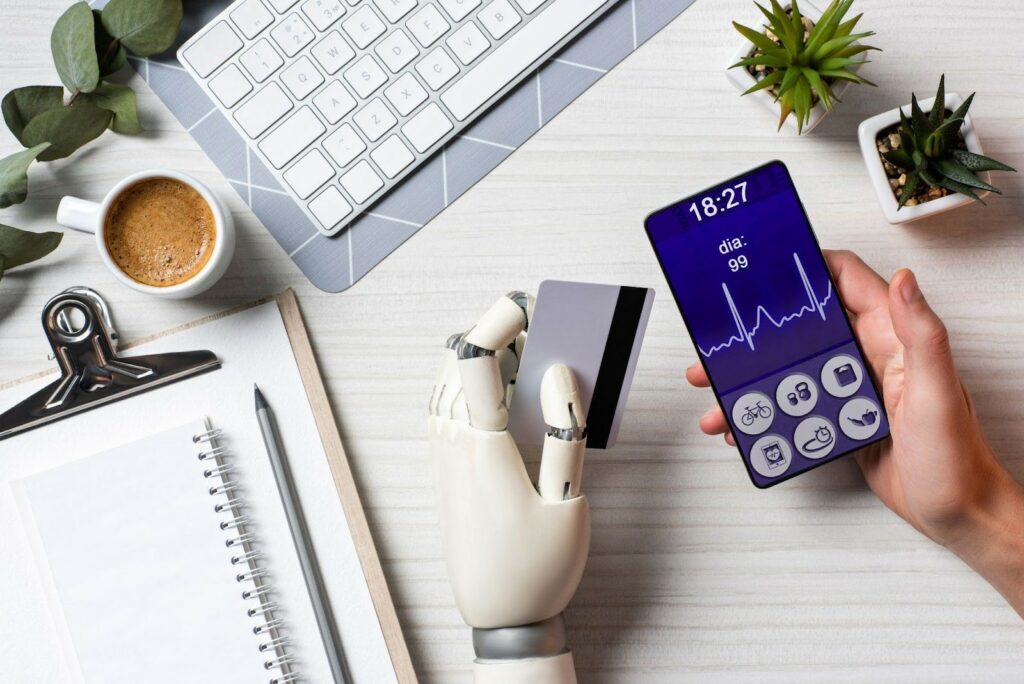
Smart devices play a significant role in healthcare. They help monitor the patients in the ICU and other medical environments. Employing artificial intelligence (AI), these devices can enhance their ability to detect indications of patient decline and recognize the development of complications.
Implementing this AI-driven approach not only betters patient outcomes but also has the potential to decrease costs associated with penalties for hospital-acquired conditions.
AI algorithms in medical devices and machines reduce doctors’ workload by analyzing complex data and sending emergency alerts promptly.
This integration of intelligent algorithms with medical devices ensures that patients receive timely and appropriate care.
5. Using Smartphones For Diagnostic Purposes
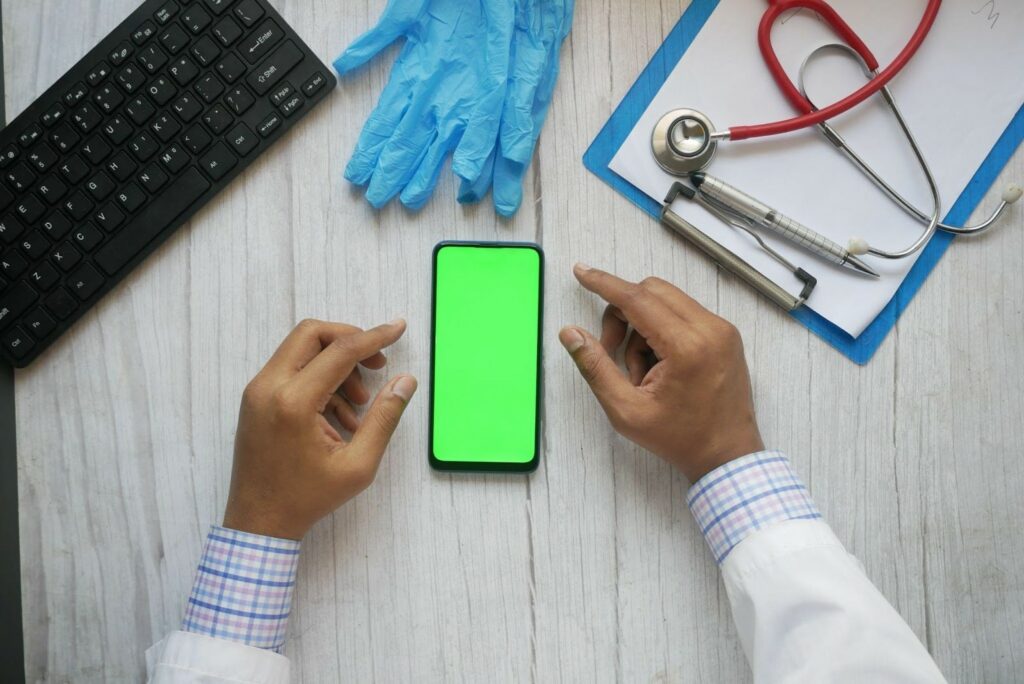
The quality of cell phone cameras is increasing every year, and they can produce images that are viable for analysis by artificial intelligence algorithms. This trend has brought early advantages to fields such as dermatology and ophthalmology.
Research from The American Academy of Ophthalmology highlights how images assist in identifying eye issues in children, preserving their vision for the future.
Additionally, the internet is filled with examples demonstrating how images of children have helped ophthalmologists to identify eye diseases early, ultimately preventing permanent vision loss in many instances.
The merging of smartphone technology and AI has the potential to make healthcare access fairer and enhance patient results, especially in remote or underserved communities.
6. Upgrading Clinical Judgments With AI Innovations
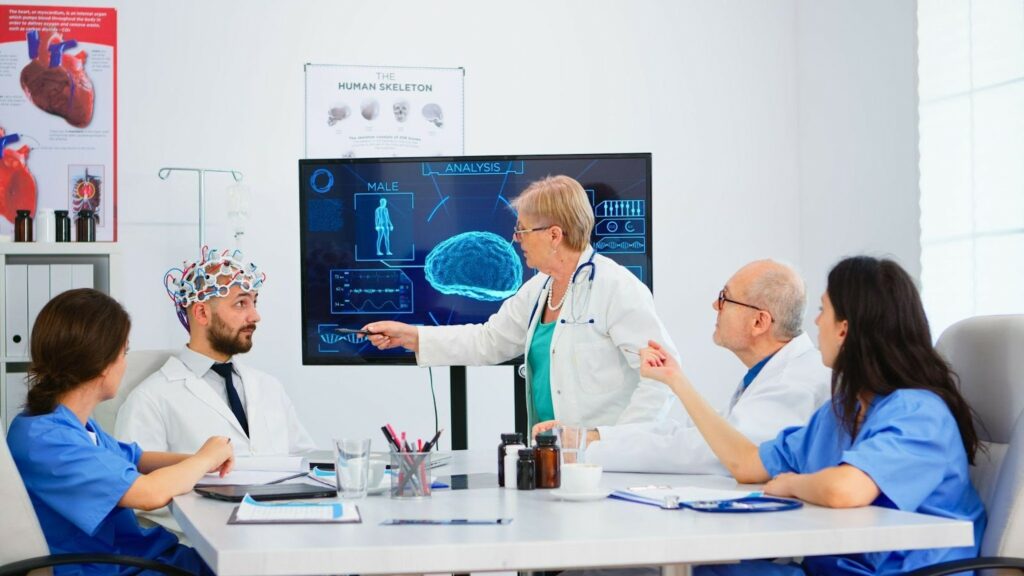
Early detection of these mistakes enables medical professionals to take quick action, guaranteeing patients take their medications as directed and adhere to recommended guidelines.
The aim of the doctors and healthcare providers here is to anticipate,
- Chronic illness
- Costly emergencies
- Sudden health declines
- Any small symptoms visible before it turns big.
For example,
- Utilizing AI, imaging scans like MRIs or CT scans can be reviewed to detect irregularities or potential diseases in their initial phases.
- Machine learning algorithms contribute to critical care decision-making processes, such as assessing whether to continue intensive care for patients who have experienced cardiac arrest and are in a coma.
With AI’s assistance, medical professionals may recognize these changes more immediately and make better decisions about how to treat patients.
Healthcare could undergo a revolution thanks to AI, but there are a number of potential obstacles to overcome. What are they? Let’s have a look at them.
What are the Challenges Faced By AI In Healthcare?

AI poses risks and challenges for healthcare organizations that demand strategic moves and thoughtful maneuvers, much like playing chess. The organizations would be able to fully utilize this cutting-edge technology if they plan their moves properly.
- Absence of Data Privacy and Security
As healthcare information becomes digitalized, organizations and providers encounter difficulties in protecting sensitive data while complying with privacy laws. AI adds to these challenges as it relies on large amounts of digital data but also poses risks to privacy and security.
This points out the importance of giving careful thought to data privacy and security measures in AI implementations within healthcare.
For example,
AI systems may unintentionally reveal confidential patient information, including diagnoses, treatment regimens, and medication records, in the absence of security protocols.
- Data Bias Concerns
Humans are prone to mistakes resulting from a lack of information or being influenced by emotions or situations. These blunders in healthcare can result in medical errors and can cause life-threatening issues to the patients, particularly when diagnoses are incorrect or delayed. Doctors and nurses using AI in healthcare might become overly dependent on it, potentially causing errors.
For example,
Consider an AI system that is taught to assess patient information and propose pain management approaches. If the training data mostly includes information from younger patients, the AI might not accurately suggest treatments suitable for elderly patients.
- Black-Box Decision Making
The cutting-edge AI technologies available today, particularly machine learning systems, hold immense promise for transforming healthcare. Yet, these systems sometimes work with obscure reasoning, causing difficulties in understanding how they arrive at their conclusions or decisions.
This lack of transparency in their functioning is commonly known as “black-box reasoning” or “black-box decision-making.” Unlike traditional programs that follow specific instructions, black-box programs learn autonomously from data and experiences to create algorithms for desired outputs.
This complicated nature can make it hard for humans to interpret or clarify how these AI systems arrive at their final conclusions.
For example,
An AI system is developed to help doctors recommend personalized treatment plans for cancer patients. After doctors input patient information, the AI system produces treatment recommendations, such as a particular chemotherapy regimen.
Despite this, the AI system does not openly disclose the exact reasons or medical signals that led to this recommendation. The system’s decision-making process remains a “black box” to the healthcare providers.
- No Clear Regulatory Framework
At the moment, it appears that there are no clear regulations or standards controlling the application of AI in healthcare. Healthcare companies must manage the confusion surrounding rules to deploy AI properly.
Patients who do not know what to anticipate from their interactions with AI systems in medical contexts may also find it troubling.
To put it another way, patients and healthcare practitioners are in the dark about the ethical and proper use of AI in healthcare since there are no clear laws in place.
For example,
Several hospitals may use AI as an additional tool in addition to human experience to increase diagnostic accuracy and speed. However, others may excessively depend on AI, risking potential oversight issues without human validation.
- Lack Of Understanding
Some hospitals employ artificial intelligence (AI) in conjunction with human medical personnel to expedite and enhance diagnosis times. Because this collaboration incorporates the best qualities of both AI and humans, it can be advantageous.
But occasionally, hospitals may rely too much on AI and undervalue the value of human verification and supervision. This over-dependence can lead to potential issues or errors that might go unnoticed without human intervention and review.
For example,
Consider a hospital that has implemented an AI-driven system to help radiologists analyze CT and X-ray scans and other medical imaging tests. In this hospital, the AI system is used as a supportive tool alongside experienced radiologists.
On the other hand, in a different hospital, there’s heavy reliance solely on AI software for medical image analysis. Radiologists may become overly dependent on the AI system’s outputs without thoroughly reviewing the results independently.
- Methodological Research Errors
There are enough methodologies to study AI in healthcare. The results that AI produces are on the basis of past patient data. However, to increase the efficiency of AI in healthcare and improve its diagnosis on the basis of real-world settings, researchers and physicians should study current patient data over time, which means prospective research.
To do this well, doctors should regularly check up on patients in person and also use remote tools like sensors and telehealth.
For example,
A hospital examines hundreds of patients every day and uses an AI system to diagnose their heart conditions. However the results given by the system are based on the past patient’s information as the data is already inserted into the AI tool.
In such scenarios, doctors may have difficulty examining current patients as in today’s times the reason for heart disease and the type of heart disease can be different from those in the past.
These were some of the challenges that might come in the way of healthcare professionals while implying AI in healthcare. Let’s move further and understand what does the future of AI holds further in the healthcare industry.
Future Implications of AI in Healthcare
AI models are still not fully ready for broad use in healthcare because of issues like
- Inconsistent data
- Research limitations and
- Concerns about protecting privacy.
However, these challenges are being worked on and can be solved. AI brings exciting possibilities for improving healthcare.
AI in healthcare facilitates healthcare providers for
- Better diagnostics
- Predicting early symptoms
- Finding new drugs
- Streamlining workflows
- Personalized treatment plans
Currently, AI and machine learning systems, like voice assistants, are already helping healthcare organizations work more efficiently.
This shows that AI has a bright future in healthcare. So, for those interested in building a career in this field, it’s important to keep up with the latest developments and advancements in AI technology.
Ending Notes
The healthcare field is at the edge of a significant transformation propelled by AI’s capabilities. This includes enhancing patient care, improving operational workflows, boosting cybersecurity measures, and much more.
While there’s a lot of excitement about AI in healthcare, it’s crucial to balance enthusiasm with careful consideration. AI is a relatively new technology that is evolving rapidly in this domain, so it’s important to approach its integration thoughtfully, cautiously, and optimistically.
Ready to elevate your healthcare marketing? Let our expert team be your guide. Reach out now to explore how we can support your goals.

